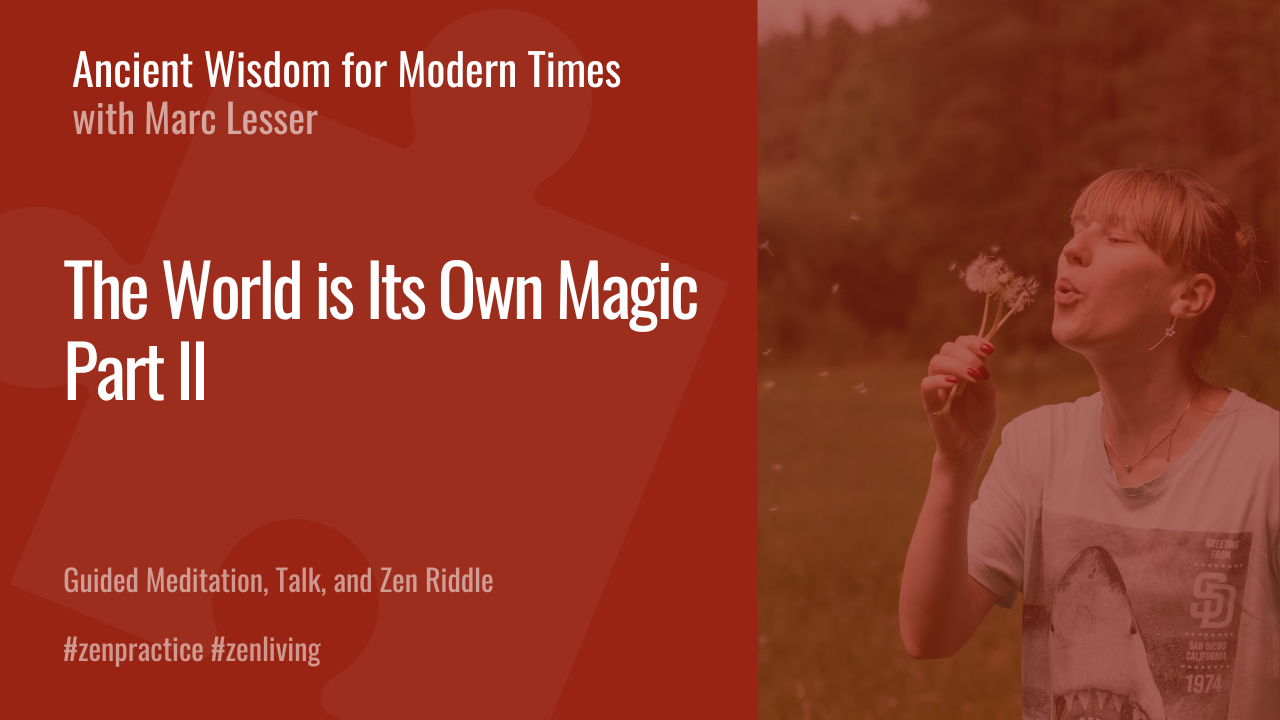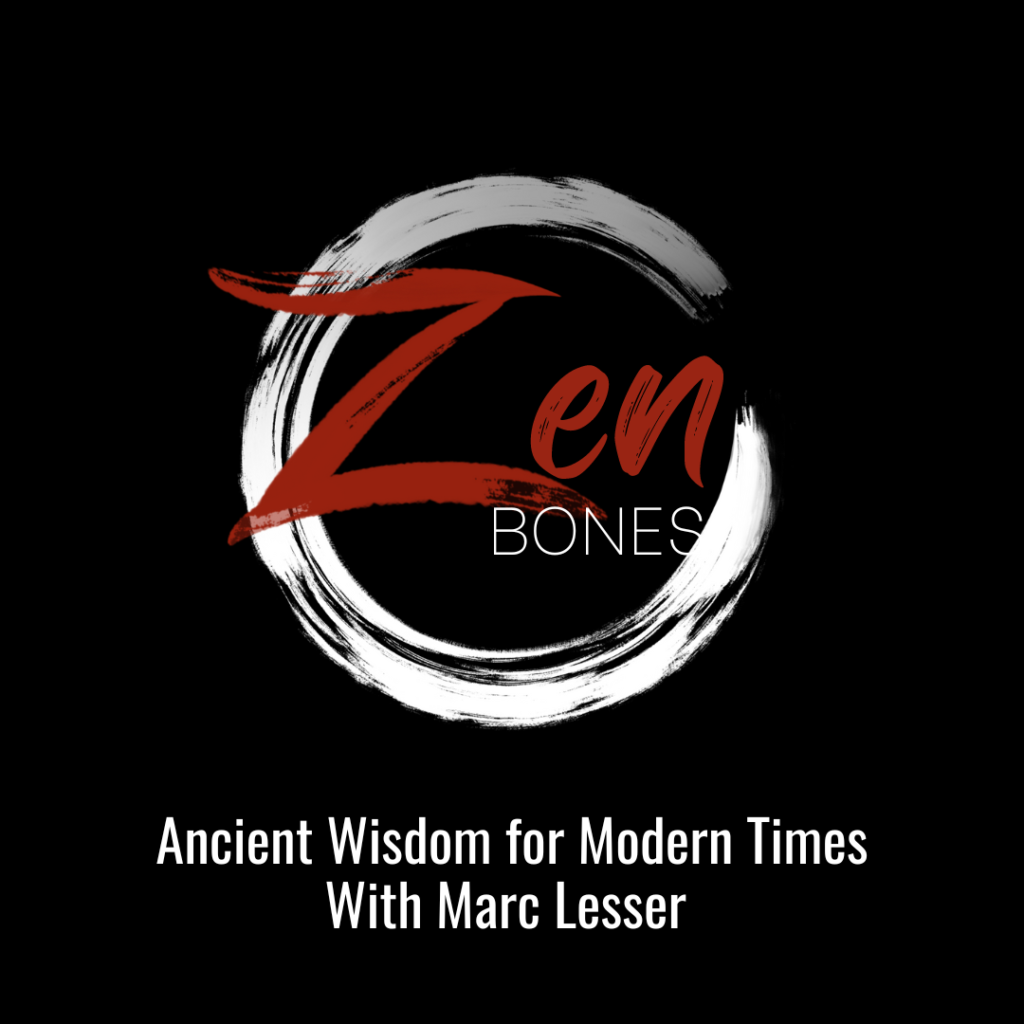In this episode we do a short meditation on finding more spaciousness, as a way of being. Marc gives a short talk on integrating the ordinary world and the sacred world, including the practice of setting an intention, practicing spaciousness, accountability, and ongoing learning. Today’s Zen puzzler is about seeing the world through the lens of non-duality.
EPISODE TRANSCRIPT
Marc Lesser: Welcome to Zen Bones. Ancient wisdom for modern times. This is Marc Lesser. Why Zen Bones? Our world is in crisis and ever-shifting, and now more than ever, more wisdom, clarity, and courage are essential, especially in the world of work, business, and leadership. The world is its own magic. In today’s episode, we begin with a short guided meditation and then I give a talk on the topic, the world is its own magic.
Unpacking this core zen teaching of non-duality, and how when we let go of our usual sense of gaining ideas and the dualistic world, a world of magic, the world of reality opens up to us. If we could just embody this teaching, this way of being, will have more courage and less fear. Today’s zen puzzler is on the same topic, seeing the world through the lens of non-duality. The world is its own magic. I hope you enjoy today’s episode.
[music]
Marc Let’s begin with some sitting practice.
[bell rings]
[silence]
Marc In this practice of pausing, stopping, dropping in. The theme for today is, the world is its own magic. I’ve always appreciated this expression from Zen teacher Shunryu Suzuki or Suzuki Roshi, the world is its own magic. Can you feel it right now? Starting just by bringing attention to the body, bringing attention to your breath. Interesting the duality of our language. Your body, your breath. I usually prefer the body, the breath.
Somehow there’s something a bit more magical, awesome, extraordinary about this sense of our bodies and our breath. No sense of belonging. For right now, starting just keeping it simple, letting go of the busyness of the day and being here, checking in. Checking in with the body. Checking in with the breath or just noticing what it’s like to be here, alive, breathing or being breathed, being embodied in this body right now. [silence]
Can you feel it? Can you feel your breath? Sense of the breath touching your nostrils. The air slightly cooler as you inhale, slightly warmer with each exhale. Bringing attention to the breath, using the breath as an anchor. Noticing the full cycles, even starting with one full cycle of an inhale and an exhale. [silence] As much as possible, cultivating an approach, an attitude of curiosity. Curiosity about this breath, this body. Warm-hearted curiosity.
Part of this practice is reducing, scanning for threats, reducing our inherent judgments, negativity bias, and instead cultivating more warm-heartedness, acceptance, self-love, self-compassion. See if you can allow those warm feelings to arise. Not forcing anything, just allowing. You can always come back to the breath, to the body. Playing and experimenting in this realm of ordinary and extraordinary. The world is its own magic when we can get out of our way.
I invite you to continue with the sitting practice or you can accompany me, I’m going to ring the bell and make a shift.
[bell rings]
[music]
Marc: The world is its own magic. I often begin leadership trainings and workshops by asking two questions that are designed in a way to go deeper, to clarify intentions and one’s personal visions. The first question is, what brings you here? This is a question about naming what’s most important in this moment and looking at the ordinary world. What are you seeking to accomplish during this time? What is your vision of a successful use of our time together right now?
The second question is, what really brings you here? This question asks you to articulate your larger, even existential goals. Again, it might be, what brings me to this profession or to this life? I ask this question in workshops because. I want people to look more deeply. To be more aware of values, to cut through the usual gaining ideas, the usual business speak about analysis and to go more deeply into your heart, to get a bit more real, a bit more vulnerable, to touch something with a little bit more depth.
I’m reminded of a time several years ago when I was asked to facilitate a few hours of a two-day retreat of a group of 16 CEOs. As I entered, this was, I think the early part of day two of this retreat, someone came out and said, “This retreat is not going well. Welcome.” I walked in and looked around at this group of CEOs and I could feel the tension. Apparently, they were working together to try to come up with a strategic plan for an organization in which they were all on the board of.
It was they were having trouble aligning. There was a good deal of tension. I decided, of course, to do what I am best at and I said, “Let’s sit.” We started with a few minutes of just being quiet. Then I got them into small groups, and I gave them three questions for each of them to spend about five minutes asking and answering in the group without being interrupted. Those questions were, why are you here on the planet? How is it going? What actions will you take in response to your first two questions?
I walked around, noticed what was happening in each of these four small groups of four people. Most people really entered this question. There were tears and real, real deep feeling about, why are you here on this planet? Why are you here? How’s it going, and what will we do? These questions have a way of shifting from the ordinary world to a more sense of depth. There’s many, many motivations for why we meditate, why we do what we do, why we come to workshops.
Sometimes in the work world, people come because the boss told them they had to, or they want to pick up some leadership tools. These motivations maybe emerge through this first question of, why are you here? The second question, why are we really here allows us to go deeper. Even this question of here. Here’s where it gets a bit magical. That there’s a way in which in reality, we humans are not quite so rooted in time and space.
What do we mean by here? What do we mean by here? What do we mean by now? We are magical creatures. Our ability to live outside of the usual constraints of time, usual constraints of space. You might practice a little bit with these two questions, what brings you here? What really brings you here? Maybe do some journal writing. Maybe take a few minutes. 12 minutes, I’ve noticed is a perfect time for writing in one’s journal. You might explore what brings you here, and what really brings you here.
Again, you can define here in several ways. Why are you here writing? Why are you with your current partner or family? Why are you here with your job or your company, your profession? Then step back, what is it that brings you alive? Why are you here now on this planet? You might consider various major arenas in your life and ask, what brings you here? What really brings you here? I love how Zen teacher Shunryu Suzuki talks about this topic of the world is its own magic.
He says, “You are living in this world as an individual, but before you take the form of a human being, you are already here. Always here.” We are always here. You think before you were born that you were not born, but how is it possible for you to appear in this world when there is no you? Because you are already there, you can appear in this world. This is rather amazing. It just makes so much sense, but we somehow get [unintelligible 00:14:18]. This is not how people generally think.
We were not trained and brought up to consider, to think, to embody this sense that we have always been here, and will always be here. This is not some made-up thing. What’s made up is the way that we usually live, the way that we generally think of past, present, and future. The way that we think of here and there. He goes on to say, “It’s not possible for something to vanish.” You may think that when you die, you disappear, that you no longer exist.
Even though you vanish, something which is existent cannot be non-existent. The world is its own magic. He goes on to say that if we can embody this, we will live with tremendous courage and tremendous sense of fearlessness. Not that we won’t have problems. We’ll have plenty of problems, but we will have a completely and utterly different approach to how we engage in our lives. How we engage in the world with our problems. The world is indeed its own magic.
I want to share a poem by David White, that I also think is beautiful way of bringing out the magic, especially the magic of here. The magic of place and time. The poem is about, Camino de Santiago, the sacred journey in Spain. The poem is called The Road to Santiago.
For the Road to Santiago
Don’t make new declarations
about what to bring
and what to leave behind.
Bring what you have,
You were always going
that way anyway,
You were always
going there all along,
So bring what you have.
Bring what you have is a way of encouraging us to appreciate everything. It’s an invitation to start over. To let go of our usual narratives and enter into a dialogue with the known as well as the unknown. The line, “You are always going there anyway.” Says to me, “Let go. Trust. Take a look at your life from a deeper vantage point. See the threads and connections of our deepest sense of our lives that don’t change, that carry us from birth and death.”
Again, this same message, same underlying message as Shunryu Suzuki, the world is its own magic. Bring what you have, bring what you have. Allow yourself to be ordinary, extraordinary, magical right now.
[music]
Marc: Welcome to the Zen Bones Puzzler, where I will regularly be presenting a story or a Zen poem or a poem. Something to contemplate, to think about. A story that has purpose. It’s about developing greater insight and reflection. Not so much for a solution, but as a way to support your practice. A kind of meditation in daily life. I want to introduce today’s Zen puzzler. This is one of my favorite parts of having done and doing this Zen Bones podcast is introducing some lightheartedness and humor that’s also combined with some sense of depth as well.
Introducing traditional and non-traditional kind of Zen stories or some particular line that comes from the Zen tradition and making it more actionable. Something that we can integrate into our daily lives. Today’s Zen puzzler is this line from a talk that Zen teacher Shunryu Suzuki gave. The talk was one called, right effort. The line that jumps out at me in today’s Zen puzzler is the world is its own magic.
You might just write that down or even in your morning or whenever you do your daily meditation, allow these words to arise and see what comes up. Whatever might emerge for you in this expression, the world is its own magic. In the talk that he does, he starts out by talking about effort. He says, “If your effort is headed in the wrong direction, and if you’re not aware of this, this is diluted effort.” The effort in our practice should be directed from achievement to nonachievement. If you do something in the spirit of non-achievement, there is a good quality to it. Just to do something without any particular effort is enough. This is very tricky, beautiful, complex, and simple territory. Something about, I’ve noticed that when I’m cooking, for instance, I envision the food, the meal that I want to create, and I gather all the ingredients. Then there’s something beautiful about then just being in the moment, and a sense of just enjoying chopping and cutting and cooking.
Then I come back, I come back to my original vision, and I notice how little by little my vision might change, I let go of it. I come back to it. I think there’s something about this in how we show up in all parts of our lives. He says, when you make some special effort to achieve something, some excessive-quality, something extra is involved. We should try to let go of excessive things. He says this point is really important and quite subtle.
He says, because all of us are doing the same thing, we make the mistake of not even realizing how much we are caught by our extra effort. This creates problems. He talks about not being involved in a dualistic idea and making our practice less dualistic. He then somehow ties this to this profound idea of life and death and saying, it’s not possible for something to vanish. You may think that when you die, you disappear. You no longer exist.
Even though it looks like you vanish, something is existent. Something that exists cannot be non-existent. This is where he adds that line in this talk on right effort, the world is its own magic. Part of this magic is seeing that we’ve always been here. We’re always in the stream of life. Even before we were born, we were here. We’re here for this short time when we look like we’re separate, when have feelings, when have problems, and then at some point, we will return to this stream that we were in before we were born.
This is the one way to talk about the world is its own magic, but I’m really interested in you exploring it and what does it mean to you? There’s no one answer these Zpuzzlers are meant as ways of opening us, helping us to go deeper and explore. Try on for this day or this week, or this life, the world is its own magic. Thank you.
[music]
Marc: Listen in each week for interviews, teachings, and guided meditations. You’ll receive supportive tools for creating more meaningful work and mindfulness practices to develop yourself, to influence your organization, and help change the world. Thank you for listening.
[00:24:12] [END OF AUDIO]









